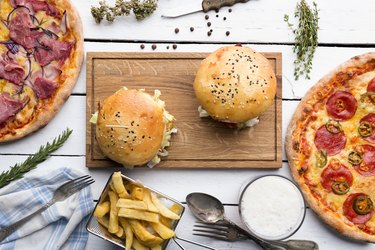
Whether it's from the flu, food poisoning or nausea, vomiting is never fun — and certain foods may make it even worse. Vomiting can be caused by a variety of issues, including bacteria, viruses, parasites, or consuming food or medication that may aggravate your stomach. It can even be caused by exercise, and may happen alongside stomach pain, diarrhea and fever. Here are some foods and beverages to completely avoid when you treat an upset stomach.
Don’t Eat Fast Food
Video of the Day
It's often difficult to even think about food right after throwing up. That's why it's recommended that you stay away from eating solid food for a few hours after vomiting, according to the Cleveland Clinic. Afterward, try sipping small amounts of water or clear liquids until your stomach can tolerate the BRAT diet: bananas, rice, applesauce and toast.
Video of the Day
There's a reason why the BRAT diet is commonly cited as the best approach to calming an upset stomach: things like bananas and plain toast are bland, simple foods. Instead of ordering a greasy hamburger or even turning to baked goods like cookies or cupcakes, maintain a diet of bland food rather than fatty or salty food. Vomiting may cause dehydration, which is why it's important to keep your salt intake low. In addition, spicy or strong-smelling food may do more to aggravate your nausea than help it.
Read more: Causes of Vomiting and Severe Stomach Cramps
Steer Clear of Dairy
It's not always a good idea to drink milk after vomiting. The American Cancer Society notes that buttermilk might be good for diarrhea; it contains less lactose than other types of milk. But consuming most dairy products like regular milk or fatty options like whipped cream may do more harm than good when it comes to vomiting.
Keep Away From FODMAP Foods
When you're throwing up, think BRAT — not FODMAP. According to Stanford Health Care, FODMAP refers to Fermentable Oligosaccharides, Disaccharides, Monosaccharides and Polyols. These are types of carbohydrates or sugars that can be found in certain foods, such as fructose (found in fruit and honey), lactose, galactans (found in beans and lentils) and polyols (found in some fruits like apricots and nectarines).
Strong cheeses like bleu or Roquefort cheese should also be avoided if you're trying to maintain a bland diet to treat vomiting or stomach nausea, according to the MedlinePlus.
Stanford notes that FODMAP foods tend to bring more water into your intestines, which may contribute to diarrhea, bloating or gastrointestinal conditions like irritable bowel syndrome. A 2016 study published in the European Journal of Nutrition found that a low-FODMAP diet helped ease symptoms of gastrointestinal disorders.
Read more: Cures for Vomiting Caused By Hangovers
Vegetables, Fiber, Coffee and Alcohol
MedlinePlus also lists certain vegetables to stay away from when you're dealing with a stomach bug, including cauliflower, broccoli, cabbage and corn. It suggests avoiding foods high in fiber, which, in addition to the vegetables above, could include whole-grain breads or pasta, pickled foods and dried fruits.
And while this may seem like a given, don't drink alcohol when you're recovering from nausea or vomiting. In some cases, alcohol may actually be the cause of vomiting. Also, steer clear of coffee or other caffeinated drinks after you vomit. These might contribute to dehydration.
- MedlinePlus: "Nausea and Vomiting - Adults"
- University of Michigan: "Diarrhea and Vomiting"
- Cleveland Clinic: "Nausea and Vomiting: Care and Treatment"
- American Academy of Family Physicians: "BRAT Diet: Recovering from an Upset Stomach"
- MedlinePlus: "Nausea and Vomiting"
- American Cancer Society: "Diarrhea"
- Stanford Health Care: "Low FODMAP Diet"
- European Journal of Nutrition: "Does a Diet Low in FODMAPs Reduce Symptoms Associated with Functional Gastrointestinal Disorders?"
- MedlinePlus: "Bland Diet"
- Cleveland Clinic: "Vomiting 101: Why You Throw Up and the Best Way to Recover"